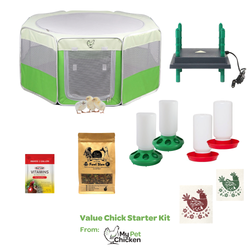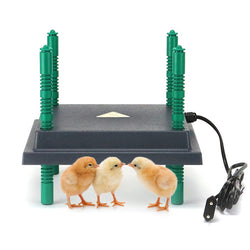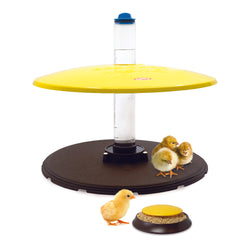How can I help my young children understand the wait to have our baby chicks delivered?
Back to blog
There are a few things you can do together to help ease the frustration of waiting!
One thing you can do with a child when waiting something out is to make a construction paper chain with the number of links equalling the number of days you must wait. Take a link off each day. Alternatively, you could simply mark days off on a calendar.
Weekly, you can devise some task to do together related to the coming chickens. For instance, one task could be picking out brooder equipment, or finding a good place for it in your home. Another task might be finding a toy for your chicks at the pet store (honestly, only one of my baby chicks ever seemed interested in the little parakeet toy I had in the brooder, but it was fun to pick out, and that bird did LOVE the toy). Another task might be to get the brooder ready and set up, and still another might include testing your brooder thermometer to see where your heat lamp needs to be to get the right temperature for them. You can work on your coop together, perhaps choosing the paint and painting your home-built coop
Having weekly tasks with your children to help get ready for your new baby chicks will not only be fun for you all, but will also help a young children take ownership of the responsibility by helping them to understand the type of care they will need in ways they will remember. Of course, we understand that parents will be the primary caregivers for the chickens, but if your children are able to help you prepare, they will see that baby chicks are not only cute little snuggle puffs, but that they ALSO rely on their human mommies and daddies to take care of them--that they are each individuals, and they need proper care. It's a positive experience.
When you receive your baby chicks, you may even be able to continue the weekly tasks as they grow: adjusting their brooder temperature to five degrees cooler every week; assigning a week for their first foray into the yard in a safe, enclosed area; offering them their first treats and so forth... and finally, moving them to the "big girl" coop when they are five or six weeks old.
Getting involved in the chicken hobby can be a positive experience for your family, beginning even before your new baby chicks arrive.
One thing you can do with a child when waiting something out is to make a construction paper chain with the number of links equalling the number of days you must wait. Take a link off each day. Alternatively, you could simply mark days off on a calendar.
Weekly, you can devise some task to do together related to the coming chickens. For instance, one task could be picking out brooder equipment, or finding a good place for it in your home. Another task might be finding a toy for your chicks at the pet store (honestly, only one of my baby chicks ever seemed interested in the little parakeet toy I had in the brooder, but it was fun to pick out, and that bird did LOVE the toy). Another task might be to get the brooder ready and set up, and still another might include testing your brooder thermometer to see where your heat lamp needs to be to get the right temperature for them. You can work on your coop together, perhaps choosing the paint and painting your home-built coop
Having weekly tasks with your children to help get ready for your new baby chicks will not only be fun for you all, but will also help a young children take ownership of the responsibility by helping them to understand the type of care they will need in ways they will remember. Of course, we understand that parents will be the primary caregivers for the chickens, but if your children are able to help you prepare, they will see that baby chicks are not only cute little snuggle puffs, but that they ALSO rely on their human mommies and daddies to take care of them--that they are each individuals, and they need proper care. It's a positive experience.
When you receive your baby chicks, you may even be able to continue the weekly tasks as they grow: adjusting their brooder temperature to five degrees cooler every week; assigning a week for their first foray into the yard in a safe, enclosed area; offering them their first treats and so forth... and finally, moving them to the "big girl" coop when they are five or six weeks old.
Getting involved in the chicken hobby can be a positive experience for your family, beginning even before your new baby chicks arrive.



